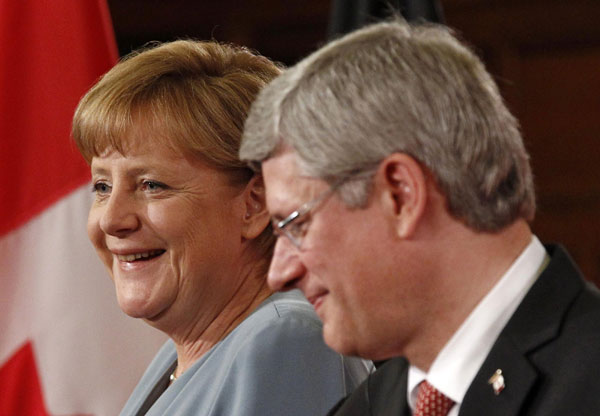Merkel offers support for Canada-EU free trade deal
Updated: 2012-08-17 09:26
(Xinhua)
|
|||||||||||
 |
|
Germany's Chancellor Angela Merkel (L) takes part in a news conference with Canada's Prime Minister Stephen Harper on Parliament Hill in Ottawa Aug 16, 2012. Merkel is on an official visit to Canada on Aug 15 and 16. [Photo/Agencies] |
OTTAWA - Canadian Prime Minister Stephen Harper received a boost Thursday from German Chancellor Angela Merkel for his country's bid to formalize a free trade pact with the European Union (EU) and termed the relationship with Germany as one of "certain friends in an uncertain world."
Merkel, in Ottawa for her first visit to Canada since becoming Chancellor in 2005 and also the first such visit by a German Chancellor in a decade, said at a joint news conference with Harper that she favored a "speedy conclusion" to Canadian and European Commission negotiations for the proposed Comprehensive Economic and Trade Agreement between Canada and the 27-nation EU.
Free trade is "one of the best engines of growth," while protectionism is "one of the greatest dangers to growth," Merkel said.
Harper pointed out the trade deal with the EU which would be Canada's second-largest pact since the 1994 North American Free Trade Agreement with the United States and Mexico would give Canada access to over 500 million consumers, who comprise the world's largest market.
Finalizing the Canada-EU trade agreement in difficult economic times should inspire major developed countries "to move forward on a trade agenda," Harper said.
According to latest statistics by Eurostat, Canada, the second largest country in the world in terms of area, is EU's 11th most important partner worldwide with a bilateral trade volume recorded at a total value of 46.8 billion euros ($57.56 billion) in 2010.
Both leaders also addressed the so-called "elephant in the room " of Canada's unwillingness to contribute to a $450 billion International Monetary Fund (IMF) to bail out the euro zone.
Harper said that issue and Canada's quest for a trade pact with the EU are "unrelated matters" and that increased trade is " essential for growth on both sides of the Atlantics."
Merkel said it would be a "great disservice" to not support Canada's trade agenda with Europe since it could help lessen the debt crisis plaguing the continent.
She also praised Canada's "tested and proven" economic approach to dealing with the recession, through both stimulus spending and government expenditure cuts, which could serve as a model for other countries.
Harper admitted that the debt and fiscal crises are very real in Europe, noting that "we can't lose sight of the necessity of continuing to focus on the creation of jobs and growth and a Canada-EU trade agreement is one of the most important things we can do in that regard."
"We have, as I've said before, complete confidence in our ability of our European friends that they have the means and the will to address their issues," he said. "We'll continue to pursue it to a successful conclusion."
Issues of international peace and security, particularly Syria, were on the agenda of their discussions, but none of them elaborated.
Harper and Merkel held bilateral talks Thursday morning in the Prime Minister's Parliament Hill office, which followed a three- hour meeting over a dinner of locally farmed elk at Harper's country retreat at Harrington Lake, Quebec, not far from the national capital, on Wednesday.
Merkel left Ottawa Thursday afternoon and traveled east to Halifax, where the onetime German environment minister visited a world-class aquatic research laboratory and witnessed the signing of a research partnership focused on ocean risks involving Canadian and German scientists, before departing for home.
Over three million Canadians trace their roots to Germany.
Related Stories
Merkel unsure if European project will work 2012-07-19 08:09
Hollande, Merkel meet to solve eurozone crisis 2012-06-28 10:36
Hu meets Merkel on ties, Eurozone debt crisis 2012-06-19 01:47
Merkel says crisis will dominate G20 summit 2012-06-15 07:54
Today's Top News
President Xi confident in recovery from quake
H7N9 update: 104 cases, 21 deaths
Telecom workers restore links
Coal mine blast kills 18 in Jilin
Intl scholarship puts China on the map
More bird flu patients discharged
Gold loses sheen, but still a safe bet
US 'turns blind eye to human rights'
Hot Topics
Lunar probe , China growth forecasts, Emission rules get tougher, China seen through 'colored lens', International board,
Editor's Picks

|

|

|

|

|

|





